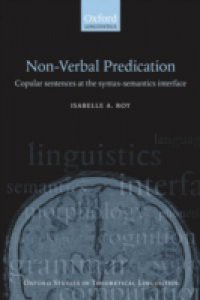This book considers the syntax and semantics of non-verbal predicates (i.e., nominal, adjectival and prepositional predicates) in copular sentences. Isabelle Roy explores how a single structure for predication can account for the different interpretations of non-verbal predicates. The book departs from earlier studies by arguing in favor of a ternary distinction between defining / characterizing / situation-descriptive predicates rather than the more commonstage-level/individual distinction. The distinction is based on two semantic criteria, namely maximality (i.e., whether the predicate describes an eventuality that has spatio-temporal properties or not) and density (i.e. whether the spatio-temporal properties are perceived as atomic or not). The author arguesin favor of a strong correlation between the semantics properties of predicates and their internal syntactic structure. Her analysis accounts for seemingly unrelated cross-linguistic data: the indefinite article in French, the distribution of the two copulas ser/estar in Spanish, and case marking on Russian predicates.

